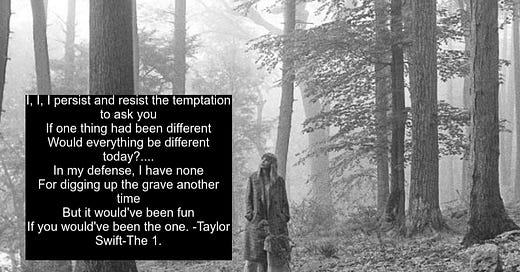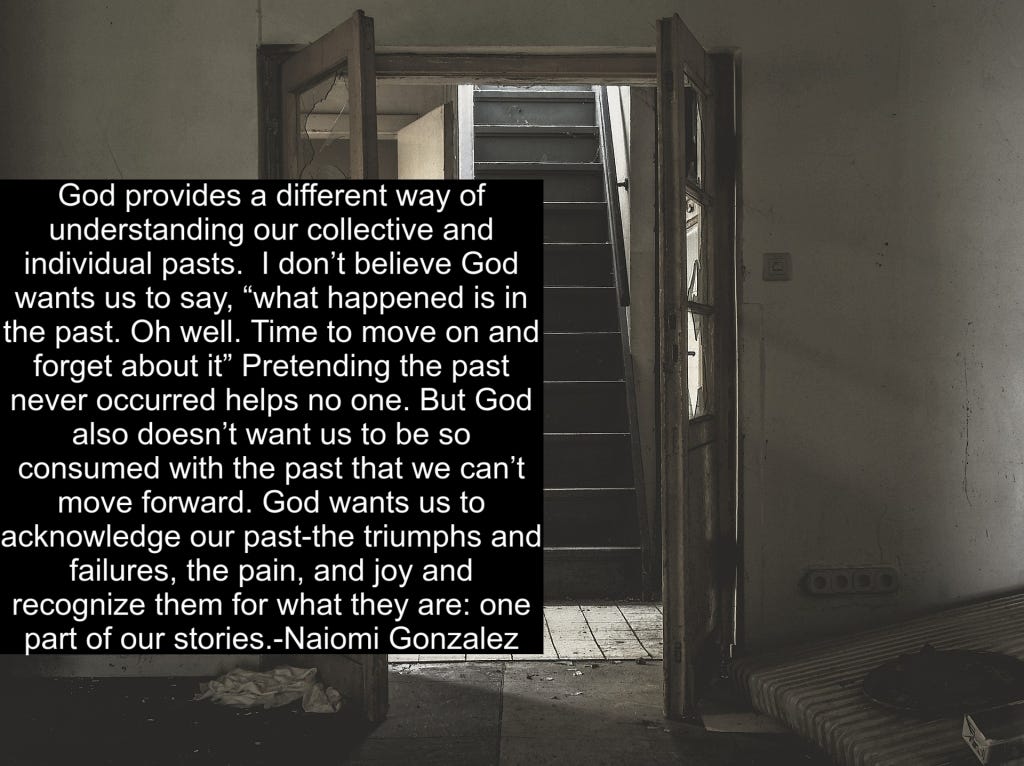Taylor Swift: The 1
First in my Taylor Swift and Theology series
Read up on what happened before you were born;
dig into the past, understand your roots.
Ask your parents what it was like before you were born;
ask the old-ones, they’ll tell you a thing or two. Deuteronomy 32:7 The Message
I’m not saying that I have this all together, that I have it made. But I am well on my way, reaching out for Christ, who has so wondrously reached out for me. Friends, don’t get me wrong: By no means do I count myself an expert in all of this, but I’ve got my eye on the goal, where God is beckoning us onward—to Jesus. I’m off and running, and I’m not turning back. Philippians 3:12-14 The Message
I, I, I persist and resist the temptation to ask you
If one thing had been different
Would everything be different today?….
In my defense, I have none
For digging up the grave another time
But it would've been fun
If you would've been the one. -Taylor Swift-The 1
As human beings we struggle with the past. On the one hand, on a national level we want to romanticize our history and to dismiss the hard, difficult, stories of violence and oppression as irrelevant. On the other hand, on an individual level, we tend to go to the opposite extreme. We focus so much on our personal histories that we are trapped by it.
Look, I love thinking about the past. I wouldn’t have studied history if I didn’t think that history matters. History is not just a list of boring dates that you need to memorize, instead it is comprised of story after story of successes and failures, of horrific injustices and courageous battles for equality.
The past cannot help us predict the future but if we take seriously the lessons learned we may not have to continue making the same mistakes again and again. But in order to learn from the past you need to be able to critically examine it without glamorizing it and, you need to learn the difference between letting the past guide your future and letting the past prevent you from moving forward.
I firmly and wholeheartedly believe that many of our struggles as a nation is the result of our inability to grapple honestly with our past. All too many Americans want to focus on the triumphs: the fights for independence, military domination and technological prowess, while ignoring the spectacular failures: the violence and oppression committed against the marginalized domestically and abroad. I argue that as a nation, we spend too much time glossing over the past and not taking it seriously.
As a result, we continue to struggle with the same issues over and over again. It’s been over 50 years since the end of Jim Crow and many of the demands on the part of Black and Brown people remain the same: an end to police brutality and unequal justice system, the end of voter disenfranchisement, and the insistence that Black and Brown people be treated as equal human beings. As a nation we need to explore and understand our history, the good parts and the bad, not pretend everything is fantastic and great.
On an individual level, however, many of us have the opposite problem. We obsess over our own histories to the point where it makes envisioning the future, let alone living in the present impossible. As a nation we like to say, “well that happened a long time ago, who cares?” but when it comes to our own individual histories, we are often trapped by the past.
Taylor Swift, is in my opinion, the queen of turning her past pain and sorrow into millions of dollars. In her music she reflects on past relationships and friendships that have collapsed. She captures the nostalgia of old relationships that she was convinced would work out and she describes the longing of “what if.” Regardless of whether you think she can sing or write, her albums sell because she understands the human tendency to want to hold onto the past and rewrite the present. Her tendency to focus on the past and what could have been has made her a successful entertainer.
But for most of us, our individual pasts become a yoke around our necks that keep us from moving forward. We aren’t making millions of dollars reflecting on our past, instead we often remain stuck. We believe, perhaps unconsciously, that if we relive our past to the point where we dissect every single decision we have made-that we could somehow prevent the outcome that caused us so much pain. But this type of obsessive focus on the past is not what I would call, “learning from our past.” To learn from our past-our individual struggles and pains, we need to be able to eventually let go of it.
Those who demand that as a nation, we need to have some accountability for our history of oppression and violence aren’t, (for the most part) asking for retribution. They aren’t saying, well white people, now you need to be enslaved and beaten on a large scale. No one is advocating for that. Instead, they are asking for the past to be told as honestly as possible and for the nation to recognize how past injustice and racism continues to play out across the country today. The point is to learn from the past in order to create a more just present and future.
This is different from how many of us view our own personal pasts. We often look back on our stories of pain and suffering not necessarily to learn from it but in the hopes of achieving some sort of retribution or redress. We think that if we ruminate on the past that somehow, we can change it. We think if we beat ourselves up over our own mistakes and failures that somehow, we can go back in time and turn that failure into a triumph. But of course, that’s not how this works.
God provides a different way of understanding our collective and individual pasts. I don’t believe God wants us to say, “what happened is in the past. Oh well. Time to move on and forget about it.” Pretending the past never occurred helps no one. But God also doesn’t want us to be so consumed with the past that we can’t move forward. God wants us to acknowledge our past-the triumphs and failures, the pain, and joy and recognize them for what they are: one part of our stories. Our past shapes us but it does not define us. God will not change our history-what has happened has happened. There’s no going back. But God provides us with the strength, courage and hope to critically explore our national and individual pasts in order to create a better today and tomorrow.
Both the tendency to idealize our national history and fixate over our individual past stories are rooted in fear. Fear that if we truly acknowledge the extent of our nation’s past violence that it will only open old wounds and fracture our nation and erase any advancements we have made in the last 50 -100 years. On an individual level we are often so afraid of the future and the present that we think holding onto the past no matter how painful, is a better alternative. But God tells us not to fear. God tells us, that on a national level, confronting our true history won’t break us but instead enable us to heal and develop the tools to create a more just society. On an individual level God tells us that the past does not have an indefinite hold over us and the future need not terrify us.
Dear God,
This is a difficult time for many of us. On the national level, issues regarding racism and injustice are coming to a head. We pray for courage so that we are able, as a society to truly reckon with our nation’s long history of injustice. Not for vengeance ‘s sake but so that we can finally heal by creating a just and equal society.
On an individual level, many of us struggle with our own past pain and hurt. Many times, we focus so much on our own past mistakes and failures that we are unable to move on. Give us the strength and courage to be break free from the toxic hold that our past may have on us.
Amen




